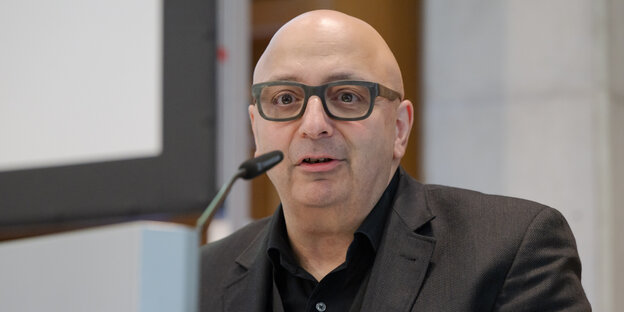If the right discovers culture itself, is there a need for more democratic art? Impressions of the Federal Cultural Policy Congress.
Sociologist from LMU Munich: Armin Nassehi Photo: Peter Adamik
The prevention paradox describes a sobering situation: apparently the measures taken could not stop the spread of an infectious disease – but something worse could perhaps have been prevented.
The fact that right-wing extremist ideas are spreading epidemically is evident not least from the results of last week’s European elections. Majorities for right-wing populists in Austria, Italy and France show that prevention is finally over. The right has been around for a long time.
The people in Berlin dealt creatively with their own failures on Thursday and Friday. The motto of this year’s Federal Congress for Cultural Policy suggested a certain hubris or at least revealed the courage to dream: “Post-polarization?”
Modern search movement
“Post” should not be understood in Latin, explained Tobias Knoblich, president of the Cultural Political Society, which is organizing the conference at the Aquino Conference Center. After all, postmodernism did not arise after, but rather from, “a search movement from modernity”.
You could possibly speak of post-polarization in Poland. The ruling right-wing PiS party lost its majority in the parliamentary elections there eight months ago. But the impression is deceptive. Right-wing parties still have a large following in Poland, says Przemysław Sadura, professor of sociology at the University of Warsaw.
Now the liberal-conservative electoral alliance has won, but it has also used populist methods, says Sadura. Prime Minister Donald Tusk’s party also stoked anti-refugee sentiment in the country and covered political opponents with hate speech.
How resilient are the institutions?
Because the populist danger in Poland has by no means been averted, at a certain point the question arises about the resilience of cultural institutions. As moderator Jochen Butt-Pośnik reports, the PiS loyal leadership has now been removed from the institutions. However, the panel participants do not consider this measure sufficient and sustainable, as the process can easily be reversed if the balance of power changes.
In cultural policy, the second half of the word policy points the way. While State Secretary for Culture Claudia Roth (Greens) made claims in her opening speech that young people in particular should have access to culture and that it should function as an expression of a democratic society, sociologist Armin Nassehi was more cautious in his keynote speech. .
Maybe it’s a mistake to always expect only the good from the culture, he says. “Culture can be the solution” – but it must always remain a problem. Cultural policy and culture never reach each other, says Nassehi. The former formulate guiding principles and design paths, but culture is only good if it is an aberration and not a reflection of politics or science.
Culture and youth and education
Mission statements and political work were also central to the ensuing discussion. Muchtar Al Ghusain is head of the cultural department of the city of Essen (SPD), but immediately emphasizes that he would not be able to fulfill his role sufficiently if he were not also responsible for the areas of youth and education.
Like many local politicians, Al Ghusain also reports that the culture hardly reaches the young people in Essen and that he also encounters increasingly conservative views. Ingolfur Blühdorn, professor of social sustainability at the Vienna University of Economics and Business, makes a general diagnosis. The vision of the future of an increasingly democratic society has recently collapsed, says Blühdorn.
The established order is no longer sustainable and the repair kit has proven inadequate. To ensure that the political situation does not deteriorate into a catastrophe, the major parties must finally refrain from making the defense of prosperity the core of their actions, the political scientist said.
Now right-wing parties like the AfD are taking advantage of the fears of poorer people, but they are known to have little interest in reversing the (property) situation. For populists, the aestheticization of politics remains the top priority, as Walter Benjamin noted during his exile in Paris in 1935: fascism sees its salvation in ‘allowing the masses to achieve their expression (by no means their right)’.
Beate Küpper, professor of social affairs at the Lower Rhine University of Applied Sciences, also says in response to Blühdorn that poverty and the AfD are not directly related. Rather, she believes that the rise of the right can also be explained by those right-wing narratives that have been given too much space.
Instead of addressing the real fear of hatred and agitation, there was too much talk about angry citizens, “whom we supposedly overwhelm with diversity,” Küpper said. She advocates a confident appearance and gives concrete recommendations for action. Cultural policy must not give in to the right and especially “not close the last left-wing cultural center in the city,” says Küpper. After all, culture is the main area of activity of the New Right.
